
A retired U.S. colonel who investigated the death of Palestinian American journalist Shireen Abu Akleh has gone public to accuse the Biden administration of “inaction” and a possible “cover-up.” Steve Gabavics says the U.S. government soft-pedaled the finding that Israeli forces intentionally killed her to appease the Israeli government. He and his colleagues were left flabbergasted by the Biden State Department’s statement attributing Abu Akleh’s killing to “tragic circumstances” rather than formally assigning blame. “It all came down to, in my mind, not trying to anger the Israelis by holding them accountable for intentionally killing an American citizen,” Gabavics tells Democracy Now!
Transcript
AMY GOODMAN: This is Democracy Now!, democracynow.org, The War and Peace Report. I’m Amy Goodman.
U.S. officials who closely examined the May 11th, 2022, shooting death of an American journalist, Palestinian American Shireen Abu Akleh, in the occupied West Bank were deeply divided over the Biden administration’s public conclusions, with some officials convinced that her killing was intentional. That’s according to The New York Times, citing five current and former U.S. officials who worked on the case, including a career military policeman with 30 years’ experience.
Speaking publicly for the first time, Colonel Steve Gabavics said the U.S. government had soft-pedaled his office’s findings to appease the Israeli government. He said he and his colleagues were left flabbergasted by the Biden State Department’s statement attributing Shireen’s killing to, quote, “tragic circumstances.” Colonel Gabavics was a key source in the Zeteo documentary Who Killed Shireen? This is Dion Nissenbaum interviewing him when he was still anonymous.
DION NISSENBAUM: Would you say that the Biden administration failed Shireen Abu Akleh?
STEVE GABAVICS: I would say so. The U.S. should have absolutely come forward and actually pressed the fact that an American citizen was killed intentionally by IDF.
AMY GOODMAN: For more, we are joined by retired Colonel Gabavics in Washington, D.C.
We welcome you to Democracy Now!, Colonel Steve Gabavics. You are speaking out after Zeteo for the first time in this global radio/television broadcast. If you can talk about what your involvement was exactly in the investigation of the killing of this American journalist, leading Palestinian American journalist on Al Jazeera, known around the world? Tell us how you came to be involved with the case and how you investigated it.
STEVE GABAVICS: Absolutely. Good morning.
So, I was — at the time, I was the chief of staff for the Office of the United States Security Coordinator for Israel and the Palestinian Authority. So, we had interactions on a regular basis with the Palestinian Authority, the Palestinian Authority security forces, and then also the government of Israel and the IDF.
When Shireen Abu Akleh was killed on May 11, 2022, it immediately became a large concern for the United States to try to figure out what had happened for this. On that same day, we started looking: OK, what can we possibly do for an investigation into her killing? Because there were reports initially that it was by a Palestinian gunman. There was no reports initially that it was by an IDF, at least not from the Israeli side. And the ambassador at the time asked our office, just because of the relationships we had, to talk to the FBI and see if it would be possible that they could do an interview — sorry, do an investigation into her killing. At that point in time, we waited for the FBI to get back, like a day or two, and they came back and said that “We cannot do so. The government of Israel has not asked us to, and it does not appear to be an act of terrorism.” As such, it did not have jurisdiction.
After this determination was made, Lieutenant General Fenzel talked with Ambassador Nides and indicated that we had law enforcement capacity, trained individuals within the USSC, myself being at that point in time 27 years as a military police officer, as well as other members from different nations that were part of the USSC. So, since there was no one else to do that investigation inquiry, I was tasked to lead that on behalf of the embassy to look into the killing of Shireen Abu Akleh.
Once that was initially determined, we started looking at all the different evidence that existed, from every type of communications that were there, video, sound recordings, immediately went out and met with the attorney general for the Palestinian Authority. We had one of our other officers go and meet with the IDF, the Central Command G3, to get a rundown of what had happened that day and how their forces were lined. And we started to see the different things happening in the media at the same point in time. So, we continued to build up our capacity and understanding of the event, before we went out actually to the site and put ourselves in position to see what actually happened on the ground, knowing what the disposition was of the Israeli forces and knowing exactly the timing and location of Shireen Abu Akeh and the rest of the journalist crew that was out there that morning.
AMY GOODMAN: So, just to set that scene, May 11, 2022, she’s outside, with a team of journalists, the Jenin refugee camp, clearly wearing that press vest and helmet. So, the vest goes up near to her neck. You’ve got the helmet. So you have to really aim to get her in the neck. So, explain what your conclusion was, who you were allowed to speak to, who you were prevented from speaking to. And what was the Israeli military unit in charge there on the ground at the time?
STEVE GABAVICS: Yeah, absolutely. So, after we reviewed all the video evidence, we looked at the autopsy, as well, and where the bullet had struck her. When we went out to the ground, we wanted to see exactly what type of aims, aiming, that the sniper had in relation to his targets, and verify whether or not he would have had the ability to see Shireen Abu Akleh and the rest of the media crew walking down the middle of the street.
So, when we went out there, the day was basically the same thing as exactly it was on May 11th, beautiful, sunny day, clear as could be, no obstructions from where the IDF sat at 190 meters away down to where Shireen Abu Akleh was at and where she was actually shot, and a clear view also down to the road where they had actually staged to start their movement up there to do recordings of, you know, what was going on with the IDF interactions that day. We looked at not only the video first to see the different shots that were fired and how they were fired. You know, al-Samoudi was shot first, and then there was a break in between, and then it was Shireen Abu Akleh who was shot. And we went to the location of the carob tree. We looked at the bullet holes themselves. There were three, actually, in the carob tree. One obviously hit her, as well. And we saw where other ones had hit between the video. All the shots that were at the carob tree and where she was hit in the head were aim shots in a very tight group, which means that they were aimed for head shots at that location. You could see it very easily.
From there, we walked up the street to the location where the IDF was set. When they were there on May 11th, they actually had armored vehicles, five armored vehicles, two that were perpendicular to the road, so they had protective fire to the north and south, and then three that were in the middle. They were the extraction team for the element that had conducted the raid in Jenin itself.
From there, we had representatives from the Palestinian Authority security forces in blue vests, and then have a helmet with, as well, so we could see them at the same exact locations that the — Shireen Abu Akleh was at. And from 190 meters away, we could clearly see, just with our plain eyes, that this was a blue vest and a blue helmet. From there, we looked and did a straight-line trajectory, utilizing some capabilities to see exactly how the angles of the shots would have gone from where they were at, and then also with an optic to see how clearly we’d be able to see that the individual was wearing a blue vest that would have said “media” and a blue helmet.
So, after we conducted that analysis, we were able to disprove very quickly the assertion that there was an — that there was a Palestinian gunman in front of Shireen Abu Akleh that the IDF had shot at and they had accidentally shot her instead, for multiple reasons. One, the actual shots, if they were shooting at a Palestinian gunman where they said they were at, based upon the elevation change and the distance, the bullets would have hit about 75 to 100 meters in front of Shireen Abu Akleh. So there’s no way that could have happened. And then, when we look at the angle trajectory of where they were shot from the vehicle that the sniper would have been in, with a scope and with the — basically, a fixed position as the barrel actually goes out through the door, and you can turret around and move it, so it’s a stable firing position, the shots were directly angled at where they hit the tree and at Shireen Abu Akleh from that location.
With the unit itself, it was the Duvdevan Unit, which is a special operations counterterror unit, highly trained and highly skilled, so we knew also definitively that the person who would have been conducting the security on both sides were trained in operation on that unit, and also the unit has excellent optics that they utilize on their weapons. At a minimum, it’d be an ACOG, could have been any other type of scope, as well. We do not know. The Israelis never gave us that information.
So, after we gathered all this up, the indications of everything we read, you know, from the reports that we got from the IDF on their locations and proximity to where the event happened, what we got from the investigation from the Palestinian Authority and our investigation, to us, it was very clear that the individual in the vehicle who took the shots — and it was one individual — would have had a clear line of sight and would have had visibility of Shireen Abu Akleh walking down the middle of the street for a period of time before he took the shots.
Even one of the examples they said, from the IDF, “Well, you know, it was a rapid thing. They were responding to other fires. You know, they didn’t see the target on — you know, they did not see Shireen Abu Akleh as a potential media person because it was so rapid,” that, you know, is dispelled also by the fact that there was the break after he had already taken aim and hit al-Samoudi and then subsequently took aimed shots then. So, no matter what, they would have had the scope and optic down the road by the time Shiren Abu Akleh was shot, and they were in clear view in the middle of the road.
AMY GOODMAN: Did the Israeli military — did the Israeli government allow you to question the Israeli military?
STEVE GABAVICS: No, they did not. The only thing that we got was them giving us the initial report of their operations that day, which basically just laid out what they were doing and their timeline and where the forces were at. This was also at the same point in time that they were saying that it wasn’t — you know, “It wasn’t us. It was a Palestinian gunman. And if it was us, by any chance, it was an absolute accident. Never would have known that she was actually there, and we did not try to shoot her.” Now, I believe they didn’t know that it was Shireen Abu Akleh. I think they knew she was in the area. But they would have known it was a journalist, for sure.
Tied to that also, just very quickly, so, one of the pieces that sort of drove the U.S. perspective on this was that Major General Fuchs, who was the Central Command commander, on the very same day Shireen Abu Akleh was shot, May 11th, he met with Lieutenant General Fenzel and basically sketched out where his forces were, and said that it was most likely a Palestinian who had shot her, but there was a possibility that it could have been an accidental shooting, based upon the fog of war, from the IDF. And that’s pretty much the stance that the, you know, USG sort of stayed with, in spite of all the evidence that transpired after that first day.
AMY GOODMAN: So, then, if you can talk about what was said at the time, at the conclusion of the report? I want to go to the Zeteo documentary, Who Killed Shireen?, in which Dion Nissenbaum speaks with the former State Department official Andrew Miller, who was deputy assistant secretary of state for Israeli-Palestinian affairs when Shireen was killed in 2022.
ANDREW MILLER: It’s nearly 100% certain that an Israeli soldier, likely a sniper, fired the shot that killed, or the shots that killed, Shireen Abu Akleh. Based on all the information we have, it is not credible to suggest that there were targets either in front of or behind Shireen Abu Akleh. The fact that the official Israeli position remains that this was a case of crossfire, this — the entire episode was a mistake, as opposed to potentially a mistaken identification or the deliberate targeting of this individual, points to, I think, a broader policy of seeking to manage the narrative.
DION NISSENBAUM: And did these Israelis ever make the soldier available to the U.S. to talk about it?
ANDREW MILLER: No. And the Israelis were not willing to present that person for even informal questioning.
AMY GOODMAN: So, that is the former State Department official, Andrew Miller. He was deputy assistant secretary of state for Israeli-Palestinian affairs when Shireen was killed back in May 2022 — not to be confused with Matthew Miller, and we want to play a clip from him from last year under President Biden. A reporter is questioning the State Department spokesperson, Matthew Miller.
REPORTER: I’m asking, like, why U.S.A. in — like, didn’t take Ayşenur case and Shireen —
MATTHEW MILLER: We have taken —
REPORTER: — Shireen Abu Akleh case seriously and suspended —
MATTHEW MILLER: So, we have —
REPORTER: — military aid to Israel?
MATTHEW MILLER: We have taken those cases —
REPORTER: And they are American.
MATTHEW MILLER: Let me — let me just — we have taken those cases extremely seriously. If you heard me yesterday when I talked at this podium, we were — I talked at length about our interactions with the government of Israel about, most recently, the Ayşenur Eygi case, where he had made clear to them that her death was unacceptable, that it should have been avoided, it should have never happened in the first place, that we want to see the results of their investigation, and we want to see them change their rules of engagement.
AMY GOODMAN: So, that was Matthew Miller. If you can explain your response? I think the term was “flabbergasted,” a number of the people engaged in this investigation, like you were, retired colonel. Explain what exactly the response is of the State Department, their conclusions that this was tragic. Tragic circumstances?
STEVE GABAVICS: Yeah, absolutely. And I’ll actually back it up a little bit, because it ties very well into the comments from Andrew Miller, as well. So, after we had completed this, we were on regular video calls, classified and unclassified, with the State Department. I spoke with Andrew Miller several times about our findings. I spoke to Ambassador Nides about my findings, as well. And I indicated to both of them, in different times, that the evidence to me indicated that there would have been enough we, if we actually built a criminal case, to have enough information and facts, to beyond a reasonable doubt, for a conviction at some level, whether it be manslaughter or something of that nature. So, that was briefed to both the ambassador, to General Fenzel, and then also to, you know, the State Department during these different engagements. So, that’s one reason why, you know, I’ve worked very closely with Andrew Miller since that point in time, as well.
So, we were anticipating, and we were pushing for, the fact that they needed to formally admit the fact that it was not an accident, that a soldier killed Shireen Abu Akleh, that it was an intentional shooting. And unfortunately, that was not what came out on July 4th. I had been going back and forth, predominantly with Lieutenant General Fenzel, and saying, “We need to make this and hold them accountable for their actions. We need the Biden administration to absolutely press Israel to follow through on this and give us answers for the killing of an American citizen, where all evidence indicates that it was an intentional thing.” And we saw, you know, the false narratives that Israel was trying to press continuously, all the way until September of actually 2022, when they finally admitted that it was the IDF that likely killed her, but still as an accident.
So, when the actual statement came out on July 4th, that was absolutely not what I expected. I know General Fenzel had been involved in writing that statement. I was not involved in the final component of the statement that was written for the State Department to release on July 4th. So I was shocked, sitting there with several other members of our team, with the public diplomacy team at the Office of Palestinian Affairs, as well, and we couldn’t understand what actually happened. We were like, “How can we even possibly say this?” Number one, there’s still data out there. All the data indicates the exact opposite. It was not fog of war. There was no way there was any, you know, Palestinian gunman in the way, or anything else that would go to the Israeli narrative. So, when that came out, it just, like, took the sails out of us, because this was not what we had found. And this continued to be a point of contention for me for the next two years as the report was written with the findings for the killing of Shireen Abu Akleh.
AMY GOODMAN: Would you call this a cover-up by the Biden administration?
STEVE GABAVICS: Definitely a lack of action. Cover-up? Maybe to a degree, yes, because many people knew within there and had the ability to reach out and find all the rest of the information from us, and chose not to after that narrative was said. So, the fact that initially Biden came out and said, when it was a Palestinian gunman, what was thought to be a Palestinian gunman, that “We will find who this was. We will make sure there’s justice for the killing of Shireen Abu Akleh,” but then, after that statement came out on July 4th, we never heard anything again from the administration whatsoever to hold Israel accountable for anything. And once there was no Palestinian gunman, they weren’t after look and find an answer for who actually killed her. So, in that sense, it was inaction, a cover-up to some degree. And it all came down to, in my mind, not trying to anger the Israelis by holding them accountable for intentionally killing an American citizen.
AMY GOODMAN: You would later retire from the State Department. You went unidentified in the Who Killed Shireen? Zeteo documentary. Why have you decided to come out fully now, identifying yourself and speaking out?
STEVE GABAVICS: So, while I was still in the military, prior to January, I couldn’t really speak out about this, not tied to being secret or anything of that nature, but just within the context of being within the military, I would have to listen to the directives of public affairs and everything else on what they allow me to talk about or not talk about.
So, after I retired, this had, like, sort of remained on my conscious continuously. And a friend of mine introduced me to Dion, and we talked, and we agreed that I would participate in the documentary. I had been, you know, concerned, to a degree, about coming forward, because potential ramifications, both personally, you know, from threats and everything else that could possibly come from it. But after the documentary came out, I was looking to come forward in about the May-June time frame, and that’s when I decided I need to keep this going, I need to talk about it, because what we need to have happen is there needs to be action taken. We cannot let our American citizens be killed anywhere around the world, without someone taking action and actually look into it and hold people accountable for it. So, I figured that the best way for me to do this and try to prevent that from happening again to journalists, to other American citizens, whatever it may be, is we have to keep this on the news cycle, in the discussions with congressional leaders, in discussions, you know, with the White House, for what has to be done.
And when I also saw what the current administration is doing in holding people accountable globally, which I very much appreciated, compared to what the Biden administration did, I thought there’s a hope also that we might be able to have additional pressure and efforts to hold Israel accountable for what they’ve done, not only just with Shireen Abu Akleh. We also had another American killed literally that same year, in January, in the hands of the IDF. And then, of course, we had an American citizen who was killed by — killed by settlers with IDF presence in July. So we have to make sure that this stuff is being dealt with seriously. That’s why I wanted to come out and be a voice for the protection of Americans.
AMY GOODMAN: Retired Colonel Steve Gabavics, I want to thank you for being with us, one of the U.S. officials closely examining the May 11, 2022, Israeli military shooting death of Palestinian American journalist Shireen Abu Akleh. He concluded her killing was intentional.
This is Democracy Now! When we come back, a man who’s being described as the “Mamdani of the Midwest,” Omar Fateh, the son of Somali immigrants, democratic socialist, seeking to unseat the incumbent Minneapolis Mayor Jacob Frey. Back in 20 seconds.

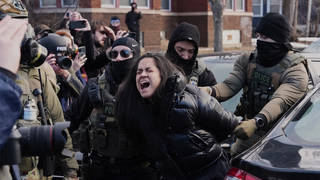
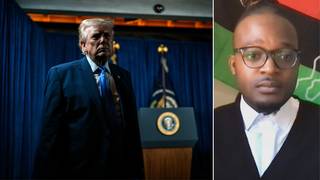

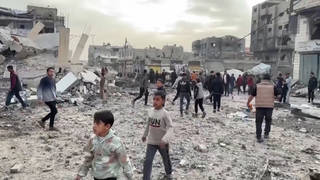





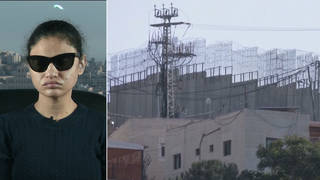

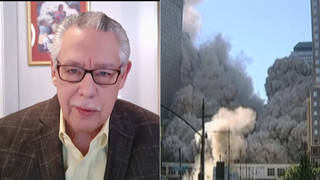
Media Options